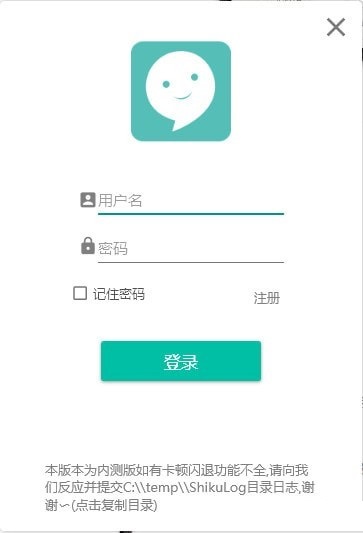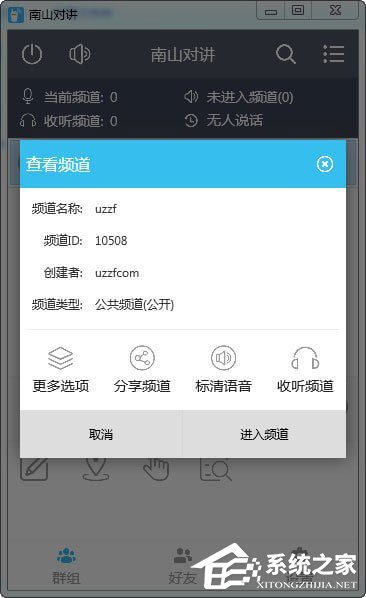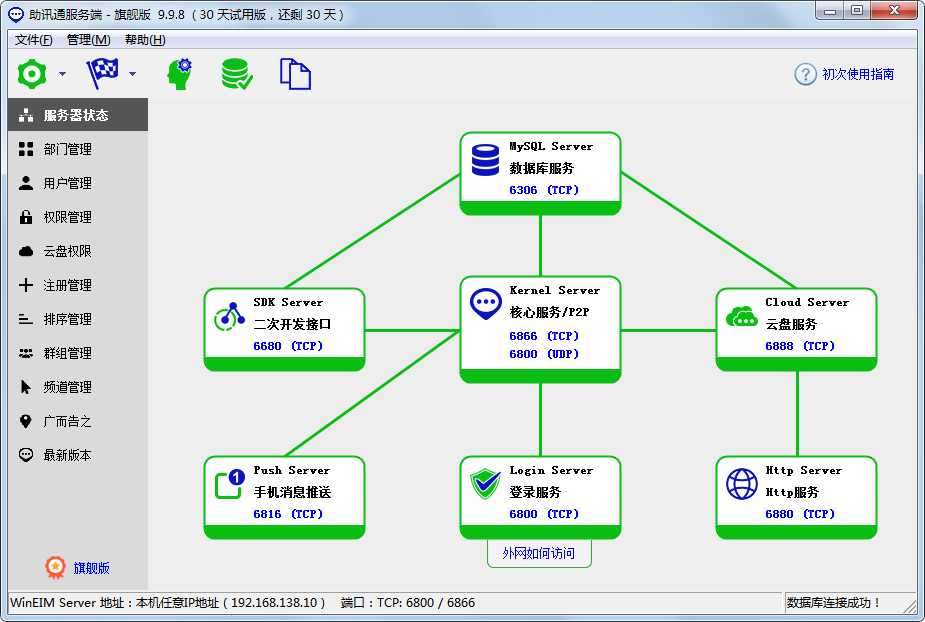【Gin-API系列】请求和响应参数的检查绑定(二)
时间:2022-03-18 18:51
参数设计
一套合格的API的服务需要规范的输入请求和标准的输出响应格式。
为了更规范的设计,也是为了代码的可读性和扩展性,我们需要对Http请求和响应做好模型设计。
- 请求
根据请求案例的设计,
我们在ip参数后面再增加一个参数oid来表示模型ID,只返回需要的模型model
// 考虑到后面会有更多的 API 路由设计,本路由可以命名为 SearchIp
type ReqGetParaSearchIp struct {
Ip string
Oid configure.Oid
}
type ReqPostParaSearchIp struct {
Ip string
Oid configure.Oid
}
const (
OidHost Oid = "HOST"
OidSwitch Oid = "SWITCH"
)
var OidArray = []Oid{OidHost, OidSwitch}
- 响应
API的响应都需要统一格式,并维护各字段的文档解释
type ResponseData struct {
Page int64 `json:"page"` // 分页显示,页码
PageSize int64 `json:"page_size"` // 分页显示,页面大小
Size int64 `json:"size"` // 返回的元素总数
Total int64 `json:"total"` // 筛选条件计算得到的总数,但可能不会全部返回
List []interface{} `json:"list"`
}
type Response struct {
Code configure.Code `json:"code"` // 响应码
Message string `json:"message"` // 响应描述
Data ResponseData `json:"data"` // 最终返回数据
}
- 请求IP合法性检查
我们需要对
search_ip接口的请求参数长度、格式、错误IP做检查。
其中,错误IP一般指的是127.0.0.1这种回环IP,或者是网关、重复的局域网IP等
func CheckIp(ipArr []string, low, high int) error {
if low > len(ipArr) || len(ipArr) > high {
return errors.New(fmt.Sprintf("请求IP数量超过限制"))
}
for _, ip := range ipArr {
if !network.MatchIpPattern(ip) {
return errors.New(fmt.Sprintf("错误的IP格式:%s", ip))
}
if network.ErrorIpPattern(ip) {
return errors.New(fmt.Sprintf("不支持的IP:%s", ip))
}
}
return nil
}
utils.network 文件
// IP地址格式匹配 "010.99.32.88" 属于正常IP
func MatchIpPattern(ip string) bool {
//pattern := `^((2[0-4]\d|25[0-5]|[01]?\d\d?)\.){3}(2[0-4]\d|25[0-5]|[01]?\d\d?)$`
//reg := regexp.MustCompile(pattern)
//return reg.MatchString(ip)
if net.ParseIP(ip) == nil {
return false
}
return true
}
// 排查错误的IP
func ErrorIpPattern(ip string) bool {
errorIpMapper := map[string]bool{
"192.168.122.1": true,
"192.168.250.1": true,
"192.168.255.1": true,
"192.168.99.1": true,
"192.168.56.1": true,
"10.10.10.1": true,
}
errorIpPrefixPattern := []string{"127.0.0.", "169.254.", "11.1.", "10.176."}
errorIpSuffixPattern := []string{".0.1"}
if _, ok := errorIpMapper[ip]; ok {
return true
}
for _, p := range errorIpPrefixPattern {
if strings.HasPrefix(ip, p) {
return true
}
}
for _, p := range errorIpSuffixPattern {
if strings.HasSuffix(ip, p) {
return true
}
}
return false
}
- 代码实现
为了通用性设计,我们将
main函数的func(c *gin.Context)独立定义成一个函数SearchIpHandlerWithGet
考虑到API的扩展和兼容,我们将对API的实现区分版本,在route文件夹中新建v1文件夹作为第一版本代码实现。
同时,我们将search_ip归类为sdk集合,存放于v1
var SearchIpHandlerWithGet = func(c *gin.Context) {
ipStr := c.DefaultQuery("ip", "")
response := route_response.Response{
Code:configure.RequestSuccess,
Data: route_response.ResponseData{List: []interface{}{}},
}
if ipStr == "" {
response.Code, response.Message = configure.RequestParameterMiss, "缺少请求参数ip"
c.JSON(http.StatusOK, response)
return
}
ipArr := strings.Split(ipStr, ",")
if err := route_request.CheckIp(ipArr, 1, 10); err != nil {
response.Code, response.Message = configure.RequestParameterRangeError, err.Error()
c.JSON(http.StatusOK, response)
return
}
hostInfo := map[string]interface{}{
"10.1.162.18": map[string]string{
"model": "主机", "IP": "10.1.162.18",
},
}
response.Data = route_response.ResponseData{
Page: 1,
PageSize: 1,
Size: 1,
Total: 1,
List: []interface{}{hostInfo, },
}
c.JSON(http.StatusOK, response)
return
}
- 结果验证
D:\> curl http://127.0.0.1:8080?ip=‘‘
{"code":4002,"message":"错误的IP格式:‘‘","data":{"page":0,"page_size":0,"size":0,"total":0,"list":[]}}
D:\> curl http://127.0.0.1:8080?ip=
{"code":4005,"message":"缺少请求参数ip","data":{"page":0,"page_size":0,"size":0,"total":0,"list":[]}}
D:\> curl http://127.0.0.1:8080?ip="10.1.1.1"
{"code":0,"message":"","data":{"page":1,"page_size":1,"size":1,"total":1,"list":[{"10.1.162.18":{"IP":"10.1.162.18","model":"主机"}}]}}
Gin.ShouldBind参数绑定
- 为了使请求参数的可读性和扩展性更强,我们使用
ShouldBind函数来对请求进行参数绑定和校验
ShouldBind 支持将Http请求内容绑定到
Gin Struct结构体,
目前支持JSON、XML、FORM请求格式绑定(请看前面定义的ReqParaSearchIp)。
- 使用方法
// ipStr := c.DefaultQuery("ip", "")
var req route_request.ReqParaSearchIp
if err := c.ShouldBindQuery(&req); err != nil {
response.Code, response.Message = configure.RequestParameterTypeError, err.Error()
c.JSON(http.StatusOK, response)
return
}
ipStr := req.Ip
if ipStr == "" {
response.Code, response.Message = configure.RequestParameterMiss, "缺少请求参数ip"
c.JSON(http.StatusOK, response)
return
}
- 注意事项
GET请求的struct使用form解析
POST请求的使用JSON解析,Content-Type使用application/json
type ReqParaSearchIp struct {
Ip string `form:"ip"`
Oid configure.Oid `form:"oid"`
}
type ReqPostParaSearchIp struct {
Ip string `json:"ip"`
Oid configure.Oid `json:"oid"`
}
- 自定义校验器
使用了
ShouldBind之后我们就可以使用第三方校验器来协助校验参数了。
还记得我们前面的参数校验吗,逻辑很简单,代码却很繁琐。
接下来,我们将使用validator.v10来做自定义校验器。
先完成
validator.v10的初始化绑定
// DefaultValidator 验证器
type DefaultValidator struct {
once sync.Once
validate *validator.Validate
}
var _ binding.StructValidator = &DefaultValidator{}
// ValidateStruct 如果接收到的类型是一个结构体或指向结构体的指针,则执行验证。
func (v *DefaultValidator) ValidateStruct(obj interface{}) error {
if kindOfData(obj) == reflect.Struct {
v.lazyinit()
if err := v.validate.Struct(obj); err != nil {
return err
}
}
return nil
}
// Engine 返回支持`StructValidator`实现的底层验证引擎
func (v *DefaultValidator) Engine() interface{} {
v.lazyinit()
return v.validate
}
func (v *DefaultValidator) lazyinit() {
v.once.Do(func() {
v.validate = validator.New()
v.validate.SetTagName("validate")
//自定义验证器 初始化
for valName, valFun := range validatorMapper {
if err := v.validate.RegisterValidation(valName, valFun); err != nil {
fmt.Println(err)
os.Exit(1)
}
}
})
}
func kindOfData(data interface{}) reflect.Kind {
value := reflect.ValueOf(data)
valueType := value.Kind()
if valueType == reflect.Ptr {
valueType = value.Elem().Kind()
}
return valueType
}
func InitValidator() {
binding.Validator = new(DefaultValidator)
}
自定义参数验证器
// 自定义参数验证器名称
const (
ValNameCheckOid string = "check_oid"
)
// 自定义参数验证器字典
var validatorMapper = map[string]func(field validator.FieldLevel) bool{
ValNameCheckOid: CheckOid,
}
// 自定义参数验证器函数
func CheckOid(field validator.FieldLevel) bool {
oid := configure.Oid(field.Field().String())
for _, id := range configure.OidArray {
if oid == id {
return true
}
}
return false
}
使用参数验证器
type ReqGetParaSearchIp struct {
Ip string `form:"ip" validate:"required"`
Oid configure.Oid `form:"oid" validate:"required,check_oid"`
}
type ReqPostParaSearchIp struct {
Ip string `json:"ip" validate:"required"`
Oid configure.Oid `json:"oid" validate:"required,check_oid"`
}
ShouldBind绑定
var SearchIpHandlerWithGet = func(c *gin.Context) {
response := route_response.Response{
Code:configure.RequestSuccess,
Data: route_response.ResponseData{List: []interface{}{}},
}
var params route_request.ReqGetParaSearchIp
if err := c.ShouldBindQuery(¶ms); err != nil {
code, msg := params.ParseError(err)
response.Code, response.Message = code, msg
c.JSON(http.StatusOK, response)
return
}
ipArr := strings.Split(params.Ip, ",")
if err := route_request.CheckIp(ipArr, 1, 10); err != nil {
response.Code, response.Message = configure.RequestParameterRangeError, err.Error()
c.JSON(http.StatusOK, response)
return
}
hostInfo := map[string]interface{}{
"10.1.162.18": map[string]string{
"model": "主机", "IP": "10.1.162.18",
},
}
response.Data = route_response.ResponseData{
Page: 1,
PageSize: 1,
Size: 1,
Total: 1,
List: []interface{}{hostInfo, },
}
c.JSON(http.StatusOK, response)
return
}
main函数初始化
func main() {
route := gin.Default()
route_request.InitValidator()
route.GET("/", v1_sdk.SearchIpHandlerWithGet)
if err := route.Run("127.0.0.1:8080"); err != nil {
fmt.Println(err)
os.Exit(1)
}
}
- 实现效果展示
D:\> curl "http://127.0.0.1:8080?ip=10.1.1.1&oid=HOST"
{"code":0,"message":"","data":{"page":1,"page_size":1,"size":1,"total":1,"list":[{"10.1.162.18":{"IP":"10.1.162.18","model":"主机"}}]}}
D:\> curl "http://127.0.0.1:8080?ip=10.1.1.1&oid=SWITCH"
{"code":0,"message":"","data":{"page":1,"page_size":1,"size":1,"total":1,"list":[{"10.1.162.18":{"IP":"10.1.162.18","model":"主机"}}]}}
D:\> curl "http://127.0.0.1:8080?ip=10.1.1.1&oid=XX"
{"code":4002,"message":"请求参数 Oid 需要传入 object id","data":{"page":0,"page_size":0,"size":0,"total":0,"list":[]}}
D:\> curl "http://127.0.0.1:8080?ip=10.1.1&oid=HOST"
{"code":4002,"message":"错误的IP格式:10.1.1","data":{"page":0,"page_size":0,"size":0,"total":0,"list":[]}}
Github 代码
请访问 或者搜索 Gin-IPs
本类排行
- 1terminate called after throwing an instance of 'std::cad_alloc' what():std::bad_alloc
- 2动态 WebApi 引擎使用教程(3行代码完成动态 WebApi 构建)
- 3windows 查看文件的md5/sha1/sha256
- 4打造一个window桌面应用:在线聊天对话机器人
- 5git windows下换行符问题 LF与CRLF转换
- 6[Linux]Windows远程CENTOS7桌面
- 7FileExistsError: [WinError 183] 当文件已存在时,无法创建该文件。
- 8K8S--可视化界面Kubernetes Dashboard(API Server方式)
- 9搜索引擎sphinx的windows安装和使用
- 10Redis安装成windows服务



























